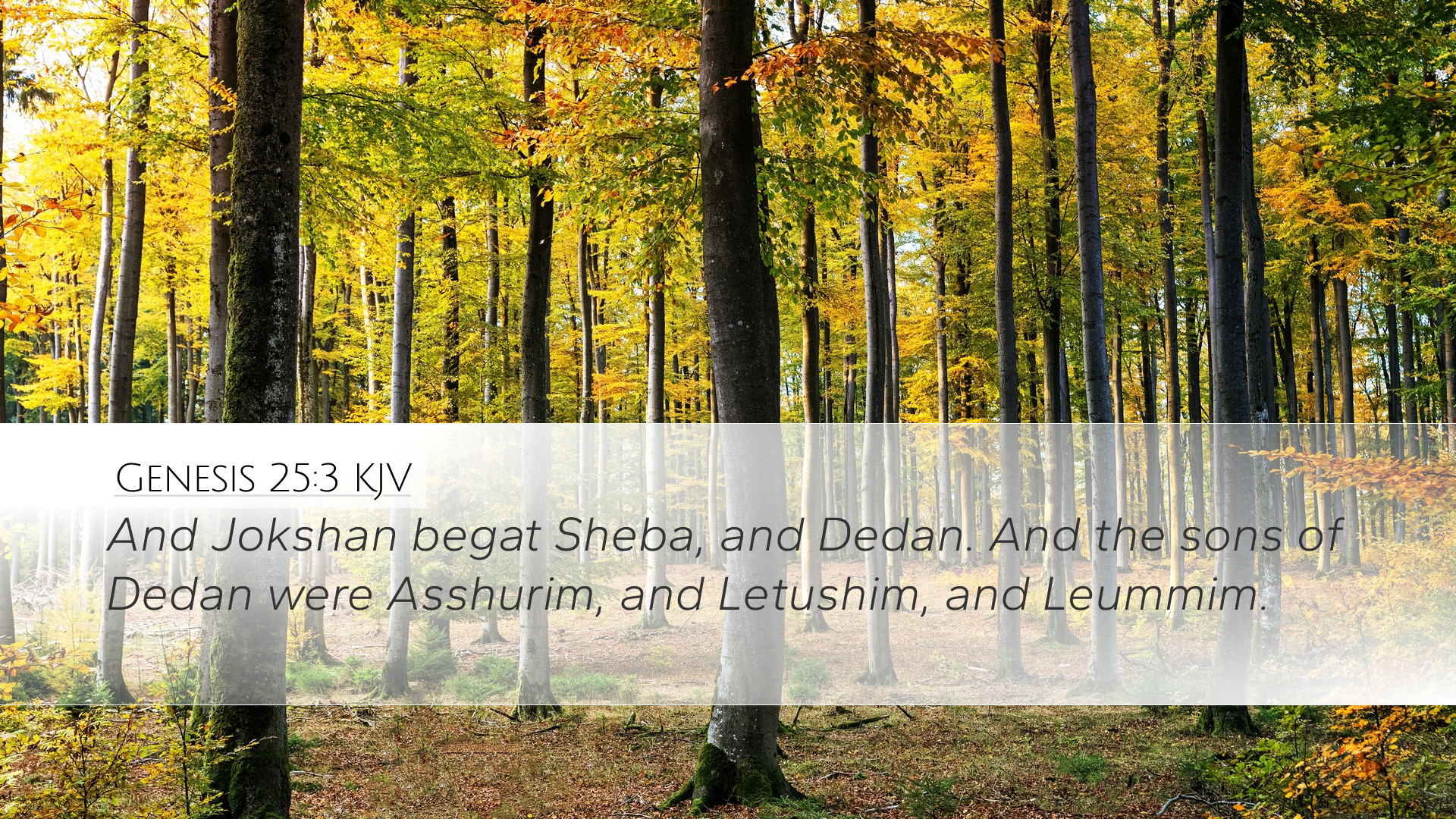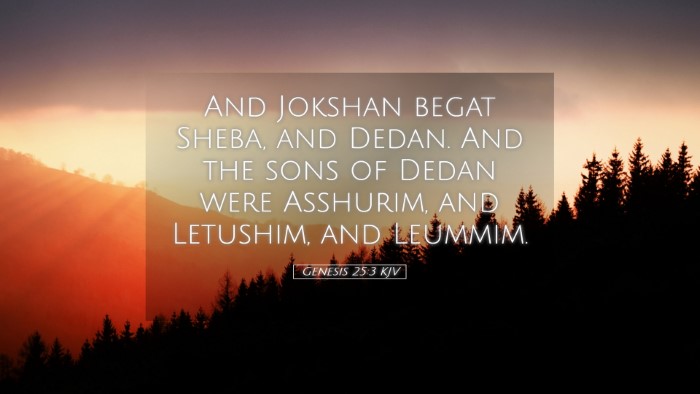Commentary on Genesis 25:3
Genesis 25:3 states:
"And Jokshan begat Sheba and Dedan: and the sons of Dedan were Asshurim, and Letushim, and Leummim."
Contextual Overview
This passage falls within the genealogical lists that often characterize the book of Genesis. The verse specifically details the descendants of Abraham through Keturah, his wife after Sarah's death. This serves not only to outline Abraham's expansive family but also to emphasize the blessings bestowed upon him by God.
Significance of Jokshan
Jokshan, the son of Abraham and Keturah, is a pivotal figure in this genealogy. His name is often linked with concepts of "to be quiet" or "to be silent," suggesting a depth of meaning about his character or role in the unfolding narrative of the biblical history.
Insights from Matthew Henry
In his comprehensive commentary, Matthew Henry highlights the grace of God in extending blessings to Abraham even after the death of Sarah. He emphasizes that God's covenant is not limited to Isaac alone but extends to all of Abraham's descendants, including those through Keturah. This extension serves as a reminder of God's generosity and the importance of spiritual heritage.
Insights from Albert Barnes
Albert Barnes notes that Keturah’s sons, including Jokshan, are presented to reveal God’s providence and the fulfillment of His promises to Abraham. He points out that these nations emerging from Jokshan signify the broadening impact of Abraham’s legacy, giving rise to groups that would later interact with Israel, thus weaving a rich tapestry of divine history.
Insights from Adam Clarke
Adam Clarke elaborates on the names listed in this verse, particularly focusing on Sheba and Dedan. He interprets Sheba as potentially linked to wealth and prosperity; the descendants of Sheba would be noted for their trade and prosperity in later biblical accounts. Clarke also discusses Dedan, indicating this name's connection to regions known for commerce and richness, signifying the blessing Abraham's lineage brings forth in terms of prosperity.
Exegetical Insights
In examining Genesis 25:3, we observe key themes relevant to the broader narrative of Genesis:
- Divine Blessing: The verse affirms that God's promises transcend human limitations and expectations. Abraham’s multiple lines of descent serve as a testament to the comprehensive nature of God's covenant.
- Preservation of Legacy: The genealogical information underscores the significance of family legacy in biblical theology; it reflects God's faithfulness in preserving the line of Abraham.
- Inclusivity of God’s Plan: The inclusion of Keturah's children demonstrates that God's redemptive plan involves not just one lineage, but many, hinting at the expansiveness of His intentions throughout history.
Theological Implications
The passage brings forth several theological implications which scholars, pastors, and theologians should consider:
- God's Sovereignty: This verse illustrates that God is sovereign over all nations and peoples that arise from His chosen ones. It affirms the Christian belief that God has a plan that includes not just the faithful but also their descendants.
- Universal Blessing: The descendants of Abraham through Keturah imply that God’s blessings are intended for all humanity, a theme that echoes throughout Scripture, notably in the New Testament.
- Continuity of Revelation: The genealogies serve as a bridge connecting various epochs of biblical history, illustrating God’s ongoing revelation to humanity through different generations.
Conclusion
Genesis 25:3, while brief, encapsulates profound truths about God’s faithfulness, the importance of heritage, and the broad scope of His redemptive plan. It encourages readers, scholars, and ministers to reflect on their own spiritual lineage and the implications of being part of God's vast family.
As we continue to explore the genealogy of Abraham, may we grasp the larger narrative of Scripture that showcases God's unwavering commitment to His covenantal promises and His desire for all nations to come to Him.


